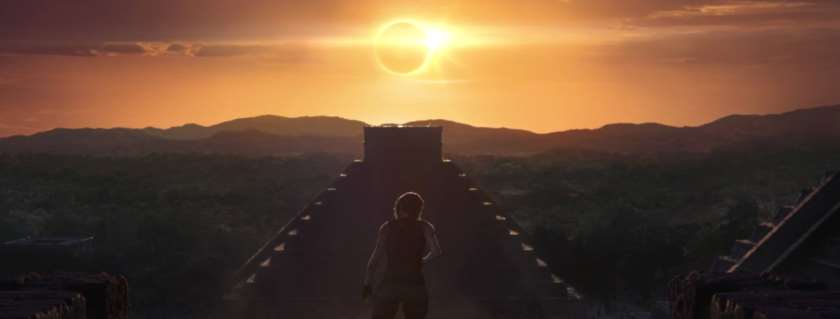Shadow of the Tomb Raider’s Confused Values

Leading up to release I was under the impression that Shadow of the Tomb Raider was intended to be a criticism of white colonialism. The developers were very clear early that Lara Croft would be the one to cause the Mayan apocalypse. The message received was that it was not her intentions but her arrogance that would lead to such grave consequences.
Swiftly the story moves into the legendary city of Paititi, a Mayan civilization untouched by and hidden from the modern world. There is a superficial reverence for the culture, trying to depict the attire and mannerisms of the indigenous peoples as accurately as possible. The game seems intent on making the player understand that the ancient Mayans weren’t “the savages” that cultural stereotypes might assume.
Then Lara violates the Prime Directive to “save” a little girl from being made a blood sacrifice at the hand of her father – an act the daughter professes to be an honor. The mother, in the meantime, is completely accepting of the murder of her husband by Lara’s hand so that her child may be saved from the ritual.
Now, I personally don’t believe in human sacrifice. I imagine a lot of first-world societies frown upon such a thing. My question isn’t whether the sacrifice is wrong or not, it’s about whether one culture or society has the right to interfere with another’s in a game supposedly critiquing white colonialism and interference.
In the original Star Trek series, the Prime Directive was created by the show’s writers as a rejection of the US government’s interference in Vietnam. The assertion was that the American government had no place influencing the shape of the developing Vietnamese society in their own personal interests. As the franchise continued, the Prime Directive took on a philosophy that highly valued observation of new, less developed worlds and societies. Ship captains and crew were constantly placed into a position where their modern ethics and morality clashed with the beliefs or the more primitive denizens or encouraged action that could result in great consequence. A society may practice a prejudice the Federation has grown to consider inhumane, or salvation can come only through the introduction of technology far ahead of their time.
As an example, suppose a world is going to be destroyed by natural causes. The planet’s population is made up of a people with no concept of space travel and no awareness of their peril. Should Starfleet save these people from their fate, removing them from their planet and transporting them to another? Such an act could easily disrupt everything these people had known. Even if they were saved, their culture would still be irreparably lost through the sudden introduction of technology, government, and philosophies not their own. However, can one truly watch an entire species go extinct when you have the power to stop it?
This particular conundrum is not particularly linked to white colonialism, but the Prime Directive still addresses a lot of the same ideas. The problem with the quest isn’t that it is taking a stance, however. It’s not even asking a question. The framing of the entire quest suggests that sacrifice is bad and the girl is simply unaware of what is “really happening”.
In Shadow of the Tomb Raider human sacrifice is portrayed as an act favored by the distinctively “bad” Mayans – the ones in service to vague evil entity Trinity.

Rewriting a culture’s history through a modern lens? Surely that’s progressive!
Now, based on a skim of Wikipedia’s summary of the topic, it seems that sacrificing one’s daughter to appease a god is a misunderstanding of such rituals anyway. Rather than educate players on the truth of Maya civilization, it reinforced stereotypes and made sure to contextualize them as bad. In reality it looks more like criminals and invaders were used as sacrifices rather than what we consider innocents. As such, these sacrifices were more akin to executions as we’d understand them, only with the added “benefit” of appeasing the gods in which the people believed.
So it might have been more in-character for, say, Jonah or his new girlfriend to have been captured at some point and offered as a sacrifice for being a foreign invader or war criminal. Or, since this is a side quest we’re discussing and not a part of the main narrative, perhaps a Trinity deserter had been captured and sentenced to execution. It would be more fitting to what we historically understand of human sacrifice in Maya culture, and we would be able to better understand Lara’s decision to interfere.
Nevertheless, those that conduct human sacrifice still remain the “bad guys”. If we’re to believe that Paititi has been untouched in every possible way – a city where time has stood still – then even the “good guys” should believe in such sacrifice themselves. Unfortunately it is central to the story’s plot that we known Conquistadors and other Trinity explorers had discovered Paititi centuries ago, bringing with them medicine, drugs, and the Christian God alike. That locals understand English also indicates that this culture would have been changed in some fashion – and not just in terms of a random shopkeeper selling guns and weapon modifications.
I could hand-wave some of this away except for the villain’s motivations. Somehow the leader of Trinity while simultaneously leading the “cult” within Paititi, his true goal is to protect his people by… I’m not sure. Not everyone under his command seems to share his goal, and it’s all the more confusing when you try to reconcile his leadership of Trinity with the events of Rise of the Tomb Raider. I think he’s supposed to be an empathetic villain, but the game points out his wrongs by having the “good” Mayan rebel Queen point out how wrong he is to be conducting sacrifice.

Nice culture ya got here. Shame if someone were to… anglify it.
In other words, the developers are taking a culture and beginning to redefine what is “good” and “bad” based on their native culture and morality. A predominantly white studio is choosing the “good” side to be “enlightened” by values pushed by white colonialist cultures while separating those “bad” attributes to the “evil” side.
As trite and considerably well-tread the “white colonialism bad” concept is throughout all of literature, film, and now games, this is perhaps one of the more oblivious and clumsy attempts I’ve seen tackle the subject. The narrative not only does disservice to Lara – making her look obnoxiously arrogant as well as ignorant and foolish – but it does not realize that recontextualizing parts of an old culture are themselves white colonialist ideas.
If the writers had approached the matter of the young girl’s sacrifice in the manner that Star Trek would have, then maybe I could be forgiven. Lara could be challenged, forced to weigh the options, and act upon her own priorities. Instead, the entire quest portrays Lara as being in the right. The moment she might become conflicted as the daughter asks when she’ll see her father again, the mother covers for her and lies. The mother clearly knows Lara just murdered the young girl’s father – “saved” her – and yet she’s surprisingly calm and well-adjusted enough to lie about it to her daughter and then thank Lara.
Everything about this quest comes from a modern assumption of “enlightenment” that views practices of an ancient culture as definitively bad. To top it all off, the game’s actual narrative places Lara in the position of unquestionable savior still.
Shadow of the Tomb Raider wants to condemn while being a product practicing that which it condemns. It not only harms the game’s attempt at a narrative, it harms Lara herself and it does harm to the perceptions of the culture it is seeking to defend.
On every conceivable level, Shadow of the Tomb Raider is a mess, inferior to either game that had come before.


